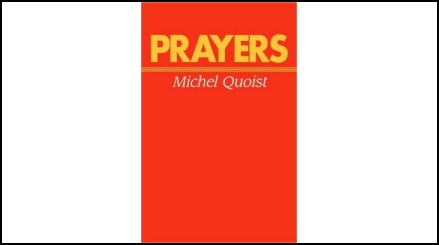
Renewing the Passion
Supporting the Vocational Calling of Catholic High School Teachers
Moments of Grace
From Where I’m Calling
September 03 2013

“I know what I want read at my funeral,” announced my 85-year-old mother-in-law. My work had brought me to her hometown of Baton Rouge, and she was gracious enough to let me have the spare bedroom for a few days.
After she made her announcement, two thoughts raced into my head: she was years away from a funeral and I was now the guy who was going to have to fulfill this request.
She reached toward the coffee table and opened a green book entitled Prayers by Michel Quoist (Sheed and Ward, 1963). There was a yellow sticky note on page 21.
The prayer on the page is called “The Wire Fence.” Mom read it aloud. The way she read it made it sound like a hymn. It filled the room with light and soul. Vivid images flooded into my mind with every word.
I couldn’t stop them.
I didn’t want to.
The prayer speaks of holes in our lives and the lives of our neighbors, and how if we join hands, we can make a fence together to adorn Paradise.
It’s a powerful image, and it made me think: How willing am I to hold hands around the holes found in family members, former friends, colleagues? Or the holes inside dreams dropped or broken. Holes in careers. Holes in causes fought for. Holes in our contradictions. Holes from selfishness, youthfulness, moral miscues, and bad ideas.
Holes from failures, layoffs, and things we should’ve said at funerals—but didn’t.
Holes from dark times, and glorious times we never appreciated enough. Holes left from grief after the death of a loved one, or of marriages gone bad.
It’s a lot easier to dismiss these holes. Ignore them. Repress them. Deny them.
How willing are we to hold tight to the neighboring wrists of our estranged siblings and our adult children? The wrists of our aging parents or difficult coworkers?
The dangerous theology of spiritual perfection—“Be perfect as your heavenly Father is perfect”—is misunderstood.
And destructive.
In our expectation for perfection, we find it difficult to accept the flaws of the human condition. Because of our expectation for perfection, our family, friends, fellow teachers, administrators, pastors, and politicians disappoint us.
We expect them to be hole-free, and are inevitably disappointed when we find out they’re not.
When she finished reading, Mom looked up at me and smiled.
“Isn’t that something?” she asked.
I nodded. Too choked up to speak.
The prayer calls us back to embrace our imperfections. To Mom, it was a prayer she wanted to leave for her loved ones, assuring every one of them that with our imperfections, we will adorn Paradise.

